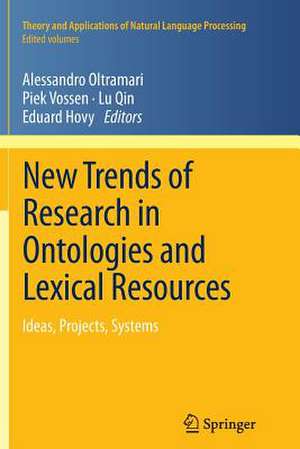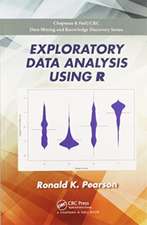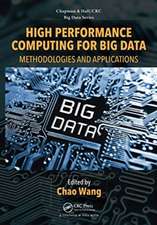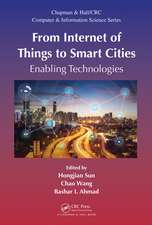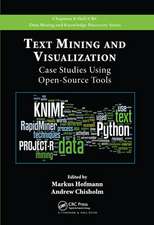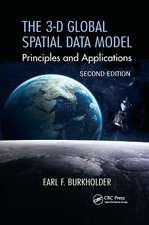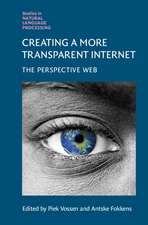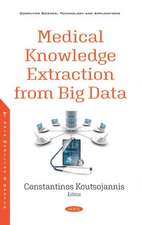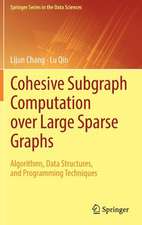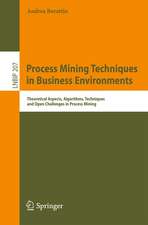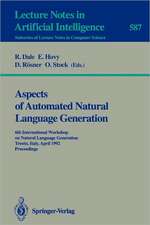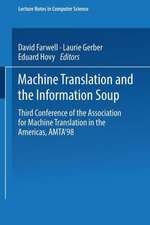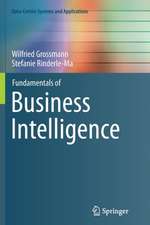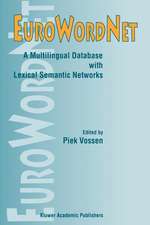New Trends of Research in Ontologies and Lexical Resources: Ideas, Projects, Systems: Theory and Applications of Natural Language Processing
Editat de Alessandro Oltramari, Piek Vossen, Lu Qin, Eduard Hovyen Limba Engleză Paperback – 7 mar 2015
to access the world models underlying that lexicon. What is a natural process for a human turns out to be an extremely hard task for a machine: computers can’t represent knowledge as effectively as humans do, which hampers, for example, meaning disambiguation and communication. Applied ontologies and NLP have been developed to face these challenges. Integrating ontologies with (possibly multilingual) lexical resources is an essential requirement to make human language understandable by machines, and also to enable interoperability and computability across information systems and, ultimately, in the Web.
This book explores recent advances in the integration of ontologies and lexical resources, including questions such as building the required infrastructure (e.g., the Semantic Web) and different formalisms, methods and platforms for eliciting, analyzing and encoding knowledge contents (e.g., multimedia, emotions, events, etc.). The contributors look towards next-generation technologies, shifting the focus from the state of the art to the future of Ontologies and Lexical Resources. This work will be of interest to research scientists, graduate students, and professionals in the fields of knowledge engineering, computational linguistics, and semantic technologies.
| Toate formatele și edițiile | Preț | Express |
|---|---|---|
| Paperback (1) | 332.57 lei 6-8 săpt. | |
| Springer Berlin, Heidelberg – 7 mar 2015 | 332.57 lei 6-8 săpt. | |
| Hardback (1) | 395.63 lei 6-8 săpt. | |
| Springer Berlin, Heidelberg – 2 feb 2013 | 395.63 lei 6-8 săpt. |
Din seria Theory and Applications of Natural Language Processing
- 15%
 Preț: 651.19 lei
Preț: 651.19 lei - 20%
 Preț: 581.04 lei
Preț: 581.04 lei - 20%
 Preț: 637.23 lei
Preț: 637.23 lei - 20%
 Preț: 644.33 lei
Preț: 644.33 lei - 20%
 Preț: 641.87 lei
Preț: 641.87 lei - 20%
 Preț: 645.65 lei
Preț: 645.65 lei - 20%
 Preț: 643.97 lei
Preț: 643.97 lei - 20%
 Preț: 334.71 lei
Preț: 334.71 lei - 20%
 Preț: 334.38 lei
Preț: 334.38 lei -
 Preț: 428.96 lei
Preț: 428.96 lei - 15%
 Preț: 645.60 lei
Preț: 645.60 lei - 20%
 Preț: 649.28 lei
Preț: 649.28 lei - 20%
 Preț: 716.23 lei
Preț: 716.23 lei - 20%
 Preț: 763.26 lei
Preț: 763.26 lei - 20%
 Preț: 818.54 lei
Preț: 818.54 lei - 20%
 Preț: 1004.48 lei
Preț: 1004.48 lei - 20%
 Preț: 938.18 lei
Preț: 938.18 lei
Preț: 332.57 lei
Preț vechi: 415.71 lei
-20% Nou
Puncte Express: 499
Preț estimativ în valută:
63.64€ • 68.05$ • 53.06£
63.64€ • 68.05$ • 53.06£
Carte tipărită la comandă
Livrare economică 17 aprilie-01 mai
Preluare comenzi: 021 569.72.76
Specificații
ISBN-13: 9783642437786
ISBN-10: 3642437788
Pagini: 300
Ilustrații: XV, 282 p. 53 illus., 20 illus. in color.
Dimensiuni: 155 x 235 x 16 mm
Greutate: 0.42 kg
Ediția:2013
Editura: Springer Berlin, Heidelberg
Colecția Springer
Seria Theory and Applications of Natural Language Processing
Locul publicării:Berlin, Heidelberg, Germany
ISBN-10: 3642437788
Pagini: 300
Ilustrații: XV, 282 p. 53 illus., 20 illus. in color.
Dimensiuni: 155 x 235 x 16 mm
Greutate: 0.42 kg
Ediția:2013
Editura: Springer Berlin, Heidelberg
Colecția Springer
Seria Theory and Applications of Natural Language Processing
Locul publicării:Berlin, Heidelberg, Germany
Cuprins
1.Introduction.- A.Oltramari, L.Qin, P.Vossen, E.Hovy.- Part I Achieving the Interoperability of Linguistic Resources in the Semantic Web.- 2.Towards Open Data for Linguistics: Linguistic Linked Data. C.Chiarcos, J.McCrae, P.Cimiano, and C.Fellbaum.- 3.Establishing Interoperability between Linguistic and Terminological Ontologies. W.Peters.- 4.On the Role of Senses in the Ontology-Lexicon. P.Cimiano, J.McCrae, P.Buitelaar, E.Montiel-Ponsoda.- Part II Event Analysis from Text and Multimedia.- 5.KYOTO: a Knowledge-rich Approach to the Interoperable Mining of Events From Text. P.Vossen, E.Agirre, G.Rigau and A.Soroa.- 6.Anchoring Background Knowledge to Rich Multimedia Contexts in the KNOWLEDGESTORE. R. Cattoni, F. Corcoglioniti, C. Girardi, B. Magnini, L. Serafini, and R. Zanoli.- 7.Lexical Mediation for Ontology-based Annotation of Multimedia. M.Cataldi, R.Damiano, V.Lombardo and A.Pizzo.- 8.Knowledge in Action: Integrating Cognitive Architectures and Ontologies. A.Oltramari, C.Lebiere.- Part III Enhancing NLP with Ontologies.- 9.Use of Ontology, Lexicon and Fact Repository for Reference Resolution in Ontological Semantics. M.McShane and S.Nirenburg.- 10.Ontology-based Semantic Interpretation via Grammar Constraints. S.Muresan.- 11.How Ontology Based Information Retrieval Systems may Benefit from Lexical Text Analysis. S.Ranwez, B.Duthil, M.F.Sy, J.Montmain, P.Augereau and V.Ranwez.- Part IV Sentiment Analysis thorugh Lexicon and Ontologies.- 12.Detecting Implicit Emotion Expressions from Text Using Ontological Resources and Lexical Learning. A.Balahur, J.M. Hermida and H.Tanev.- 13.The Agile Cliché: Using Flexible Stereotypes as Building Blocks in the Construction of an Affective Lexicon. T.Veale.
Recenzii
From the reviews:
“This exquisite collection of really trendsetting research is captivating reading for any student, scholar, or engineer interested in the growing field of semantic technologies and the semantic web. … The book is recommended as mandatory reading for all serious NLP and semantic web students and experts.” (Mariana Damova, Computing Reviews, September, 2013)
“This exquisite collection of really trendsetting research is captivating reading for any student, scholar, or engineer interested in the growing field of semantic technologies and the semantic web. … The book is recommended as mandatory reading for all serious NLP and semantic web students and experts.” (Mariana Damova, Computing Reviews, September, 2013)
Textul de pe ultima copertă
In order to exchange knowledge, humans need to share a common lexicon of words as well as
to access the world models underlying that lexicon. What is a natural process for a human turns out to be an extremely hard task for a machine: computers can’t represent knowledge as effectively as humans do, which hampers, for example, meaning disambiguation and communication. Applied ontologies and NLP have been developed to face these challenges. Integrating ontologies with (possibly multilingual) lexical resources is an essential requirement to make human language understandable by machines, and also to enable interoperability and computability across information systems and, ultimately, in the Web.
This book explores recent advances in the integration of ontologies and lexical resources, including questions such as building the required infrastructure (e.g., the Semantic Web) and different formalisms, methods and platforms for eliciting, analyzing and encoding knowledge contents (e.g., multimedia, emotions, events, etc.). The contributors look towards next-generation technologies, shifting the focus from the state of the art to the future of Ontologies and Lexical Resources. This work will be of interest to research scientists, graduate students, and professionals in the fields of knowledge engineering, computational linguistics, and semantic technologies.
to access the world models underlying that lexicon. What is a natural process for a human turns out to be an extremely hard task for a machine: computers can’t represent knowledge as effectively as humans do, which hampers, for example, meaning disambiguation and communication. Applied ontologies and NLP have been developed to face these challenges. Integrating ontologies with (possibly multilingual) lexical resources is an essential requirement to make human language understandable by machines, and also to enable interoperability and computability across information systems and, ultimately, in the Web.
This book explores recent advances in the integration of ontologies and lexical resources, including questions such as building the required infrastructure (e.g., the Semantic Web) and different formalisms, methods and platforms for eliciting, analyzing and encoding knowledge contents (e.g., multimedia, emotions, events, etc.). The contributors look towards next-generation technologies, shifting the focus from the state of the art to the future of Ontologies and Lexical Resources. This work will be of interest to research scientists, graduate students, and professionals in the fields of knowledge engineering, computational linguistics, and semantic technologies.
Caracteristici
Focusing on new trends of research instead of state of the art Based on an original top event in the field (OntoLex 2010 workshop at COLING 2010) Explores sinergies with new application domains (Augmented Reality, Social Networking, "Internet of Things", etc.) Includes supplementary material: sn.pub/extras
